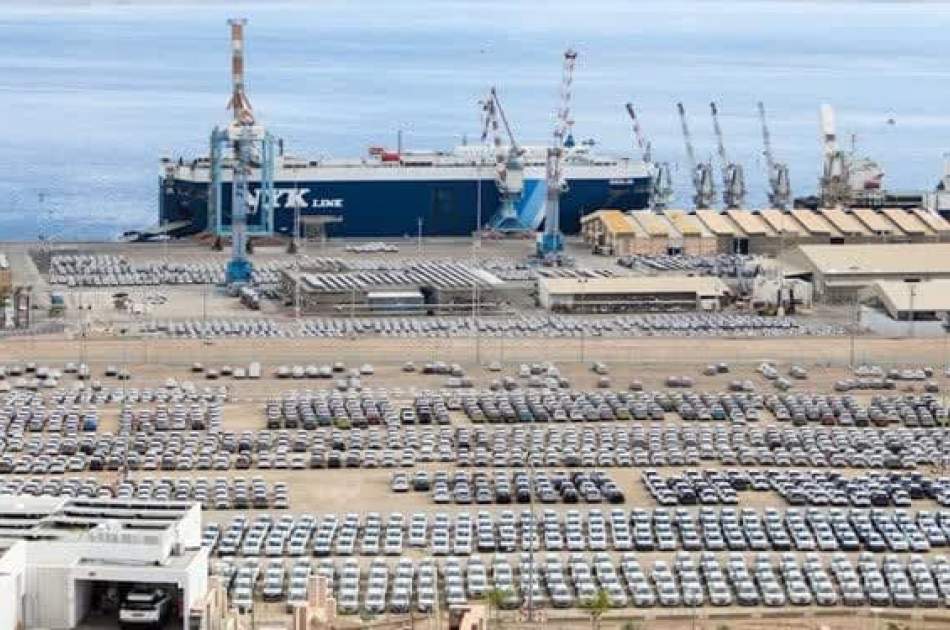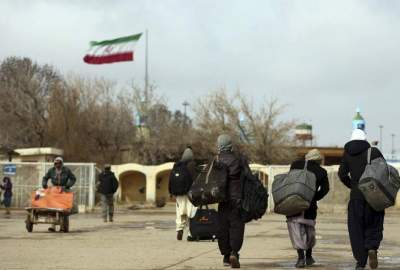By turning the Makran and Red seas into hell for Israeli ships, Yemen has put Eilat port on the verge of closure.
Publish dateMonday 4 December 2023 - 12:12
Story Code : 281556
Afghan Voice Agency (AVA) - Monitoring: Two years ago, when Muhammad Al-Bakhiti, one of the leaders of Yemen's Ansarullah Movement, said in a live Al Jazeera program, according to the Quranic texts, we Yemenis will liberate the Holy City, God willing, some people, including the Al Jazeera host, mocked and did not take this seriously, but today they see that Yemen, a country that is itself completely surrounded by the Saudi-American coalition, is effectively helping Gaza.
Warnings that were implemented
At the beginning of the current war in Gaza, Yemen warned Israel that if the Zionist regime launched a ground attack on Gaza, Sana'a would go to war with Tel Aviv in support of Gaza, yet many did not take this position seriously. However, three days after the ground attack began, on October 31, Yemen targeted the port and city of Eilat in the southernmost point of occupied Palestine with several missiles and drones to show that among the Arab rulers, the rulers of Sana'a are true to their word.
As the war progressed, Yemeni attacks on this southern city increased. Since this action of Yemen was not as effective as it should have been and Israel did not deliberately respond to these actions of Yemen during this period, Yemen announced that it will not allow Israeli ships to safely pass through the Bab al-Mandab strait and the Red Sea from now on.
On November 19, Sana'a announced the seizure of the commercial ship Galaxy Leader, which is owned by an Israeli businessman. The Yemeni forces moved it to the coast of Yemen to ambush other Israeli ships. On Sunday, December 3rd, Yemen announced the attack on two other ships. The spokesperson of the Yemeni Armed Forces said that two ships, "Unity Explorer" and "Number Nine" ship, were targeted; the first ship was targeted by a Navy missile and the second by a Navy drone.
Eilat port under pressure from Yemen
Following this Yemeni action, the port of Eilat was under pressure. This pressure has increased to the point that the economic news website Gallobs wrote on Sunday that Itlat port is the biggest loser in the war of ports. The war has caused huge damages to the port of Eilat. Informed sources in the industrial sector say that if the government does not do anything, we should think about laying off the employees and workers of the port and closing it.
Most of the imported cars enter occupied Palestine from this port. While every three months, about 37,000 to 47,000 cars were imported from Eilat port, this number decreased to 9,000 cars in October (the month the war started). The regime's Ministry of Transportation has not published the November statistics, but this downward trend has definitely intensified. Most of the 21,000 cars that were supposed to be imported in December are being imported through Haifa port.
Although, according to Israeli experts, this decrease is not unrelated to the end of the year (A.D.) and purchases will decrease, but the impact of the war is quite clear.
Also, the car parking tariff has increased in Eilat. On the other hand, the replacement of Haifa port in the north of occupied Palestine has increased the transportation distance and its costs. The geopolitical horizon of Eilat port is dark. Companies like Zim and others have announced that they cannot cross the Red Sea and pass the Suez Canal at the moment and have to substitute other routes which are much longer.
Eilat port officials say that almost no ships enter the port these days. Gideon Golbar, the director of this port, told the local newspaper "Yom Yom" (Ruz Roz), that the threat of the Houthis has affected the traffic of all ships, both those ships that came from the Red Sea and those that arrived from the Mediterranean. The danger zone is at the gate of Egypt.
Tariff increase by Europe; Double pressure from YemenThe tragedy of the increase in transportation costs from Europe was small, the Yemeni pressure has caused the ships to bypass the African continent instead of the Red Sea and the Suez Canal and deliver the goods to occupied Palestine through the Mediterranean. Daniel Shamal, the correspondent of Marker Israel, says that Israel's shipping industry has a challenge from the West these days, and that is that Grimaldi Company, one of the largest companies that transport goods from Europe to Israel, announced yesterday, Sunday, that from January 1st (less From one month, the cost of transportation will be 4% more expensive due to the environmental tax of Europe, while Yemen has also caused ships coming from the east to have to go to the African continent instead of the Red Sea and the Suez Canal. bypass to reach the coast of Israel. For example, on this route, the arrival time of a ship that left China to reach Israel reaches two months, and it also increases the costs altogether.
The reporter of Israel's Marker newspaper is right; Yemen's threats have made the movement of ships coming from Far East miserable. The ships coming from Japan, India and China to occupied Palestine have to take the route of the Cape of Good Hope instead of the Mokran Sea (Arabian Sea), the Strait of Bab al-Mandab, the Red Sea and finally the Suez Canal, and make a long lunar circuit to go through the Mediterranean. Reach occupied Palestine.
The imposed route of Omid Nik's Cape instead of Bab Al-Mandab
In such a situation, the management of Eilat port says that if the government does not take action, it should close the doors of the port due to the heavy costs and non-entry of the ship, and they have communicated this to various ministries. Although it is possible that with financial assistance from other countries, this port will not be closed for the time being, but the Zionist regime is well aware that the budget of next year is facing many problems due to the increase in the expenses of the Ministry of War, and Israel has to pay ten billion shekels of other expenses to cover half of the budget. Finance the war and provide the other half through borrowing or raising internal taxes. Therefore, the economic sector of this regime cannot tolerate the prolongation of the war.
The pressure that Yemen has put on the Zionist regime in this way will be effective in its own way; effective in the set of factors by which Tel Aviv is forced to decide the war as soon as possible; A war that hasn't achieved any of the declared goals so far, and on the other hand, its goals have been and are only residential houses, hospitals, refugee camps, and public gathering centers.
A few days ago, the Minister of Transportation, Mary Regev, along with her office manager, Moshe Ben Zakon, went to Eilat Port and during a visit there, they promised that they will not allow this port, which has been handed over to the private sector for several years, to be closed because Eilat Port and the airport Ramon plays the role of sea and air port for Israeli imports. The two did not take into account that if the port of Eilat is Israel's import gate, the Bab al-Mandeb strait, which is in Yemen's possession, is the first gate that is currently closed to Israeli ships.
The port of Eilat is just another economic pressure that the Zionist regime is enduring. It should be seen how much the Israeli economy can withstand the prolongation of the war./Fars News
Warnings that were implemented
At the beginning of the current war in Gaza, Yemen warned Israel that if the Zionist regime launched a ground attack on Gaza, Sana'a would go to war with Tel Aviv in support of Gaza, yet many did not take this position seriously. However, three days after the ground attack began, on October 31, Yemen targeted the port and city of Eilat in the southernmost point of occupied Palestine with several missiles and drones to show that among the Arab rulers, the rulers of Sana'a are true to their word.
As the war progressed, Yemeni attacks on this southern city increased. Since this action of Yemen was not as effective as it should have been and Israel did not deliberately respond to these actions of Yemen during this period, Yemen announced that it will not allow Israeli ships to safely pass through the Bab al-Mandab strait and the Red Sea from now on.
On November 19, Sana'a announced the seizure of the commercial ship Galaxy Leader, which is owned by an Israeli businessman. The Yemeni forces moved it to the coast of Yemen to ambush other Israeli ships. On Sunday, December 3rd, Yemen announced the attack on two other ships. The spokesperson of the Yemeni Armed Forces said that two ships, "Unity Explorer" and "Number Nine" ship, were targeted; the first ship was targeted by a Navy missile and the second by a Navy drone.
Eilat port under pressure from Yemen
Following this Yemeni action, the port of Eilat was under pressure. This pressure has increased to the point that the economic news website Gallobs wrote on Sunday that Itlat port is the biggest loser in the war of ports. The war has caused huge damages to the port of Eilat. Informed sources in the industrial sector say that if the government does not do anything, we should think about laying off the employees and workers of the port and closing it.
Most of the imported cars enter occupied Palestine from this port. While every three months, about 37,000 to 47,000 cars were imported from Eilat port, this number decreased to 9,000 cars in October (the month the war started). The regime's Ministry of Transportation has not published the November statistics, but this downward trend has definitely intensified. Most of the 21,000 cars that were supposed to be imported in December are being imported through Haifa port.
Although, according to Israeli experts, this decrease is not unrelated to the end of the year (A.D.) and purchases will decrease, but the impact of the war is quite clear.
Also, the car parking tariff has increased in Eilat. On the other hand, the replacement of Haifa port in the north of occupied Palestine has increased the transportation distance and its costs. The geopolitical horizon of Eilat port is dark. Companies like Zim and others have announced that they cannot cross the Red Sea and pass the Suez Canal at the moment and have to substitute other routes which are much longer.
Eilat port officials say that almost no ships enter the port these days. Gideon Golbar, the director of this port, told the local newspaper "Yom Yom" (Ruz Roz), that the threat of the Houthis has affected the traffic of all ships, both those ships that came from the Red Sea and those that arrived from the Mediterranean. The danger zone is at the gate of Egypt.
Tariff increase by Europe; Double pressure from YemenThe tragedy of the increase in transportation costs from Europe was small, the Yemeni pressure has caused the ships to bypass the African continent instead of the Red Sea and the Suez Canal and deliver the goods to occupied Palestine through the Mediterranean. Daniel Shamal, the correspondent of Marker Israel, says that Israel's shipping industry has a challenge from the West these days, and that is that Grimaldi Company, one of the largest companies that transport goods from Europe to Israel, announced yesterday, Sunday, that from January 1st (less From one month, the cost of transportation will be 4% more expensive due to the environmental tax of Europe, while Yemen has also caused ships coming from the east to have to go to the African continent instead of the Red Sea and the Suez Canal. bypass to reach the coast of Israel. For example, on this route, the arrival time of a ship that left China to reach Israel reaches two months, and it also increases the costs altogether.
The reporter of Israel's Marker newspaper is right; Yemen's threats have made the movement of ships coming from Far East miserable. The ships coming from Japan, India and China to occupied Palestine have to take the route of the Cape of Good Hope instead of the Mokran Sea (Arabian Sea), the Strait of Bab al-Mandab, the Red Sea and finally the Suez Canal, and make a long lunar circuit to go through the Mediterranean. Reach occupied Palestine.
The imposed route of Omid Nik's Cape instead of Bab Al-Mandab
In such a situation, the management of Eilat port says that if the government does not take action, it should close the doors of the port due to the heavy costs and non-entry of the ship, and they have communicated this to various ministries. Although it is possible that with financial assistance from other countries, this port will not be closed for the time being, but the Zionist regime is well aware that the budget of next year is facing many problems due to the increase in the expenses of the Ministry of War, and Israel has to pay ten billion shekels of other expenses to cover half of the budget. Finance the war and provide the other half through borrowing or raising internal taxes. Therefore, the economic sector of this regime cannot tolerate the prolongation of the war.
The pressure that Yemen has put on the Zionist regime in this way will be effective in its own way; effective in the set of factors by which Tel Aviv is forced to decide the war as soon as possible; A war that hasn't achieved any of the declared goals so far, and on the other hand, its goals have been and are only residential houses, hospitals, refugee camps, and public gathering centers.
A few days ago, the Minister of Transportation, Mary Regev, along with her office manager, Moshe Ben Zakon, went to Eilat Port and during a visit there, they promised that they will not allow this port, which has been handed over to the private sector for several years, to be closed because Eilat Port and the airport Ramon plays the role of sea and air port for Israeli imports. The two did not take into account that if the port of Eilat is Israel's import gate, the Bab al-Mandeb strait, which is in Yemen's possession, is the first gate that is currently closed to Israeli ships.
The port of Eilat is just another economic pressure that the Zionist regime is enduring. It should be seen how much the Israeli economy can withstand the prolongation of the war./Fars News
avapress.com/vdcgnq9x3ak97n4.5jra.html
Tags
Top hits







